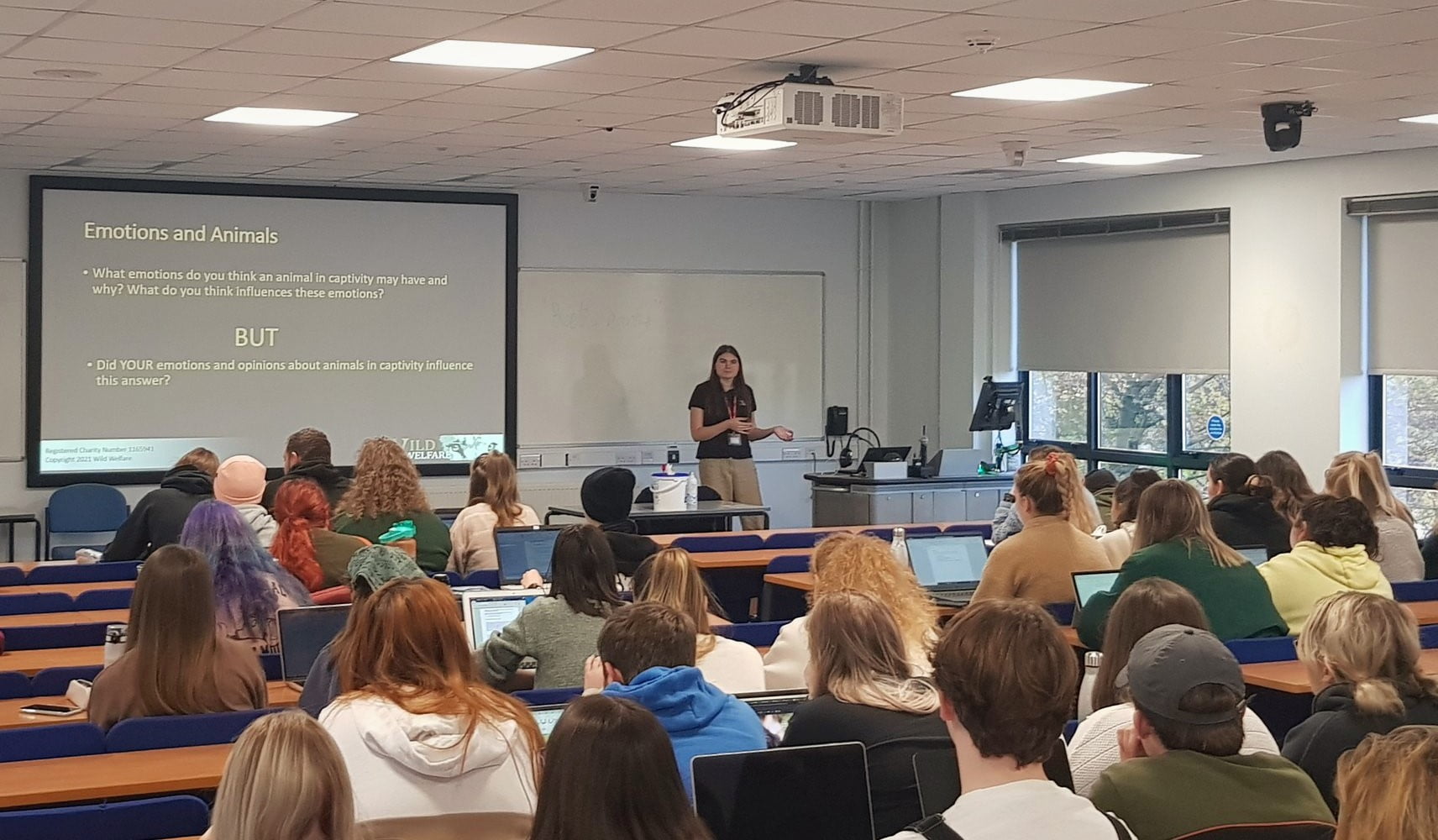Back in the Classroom – Anthrozoology and Animal Welfare
Wild Welfare has returned to in-person training for the first time in over two years and it’s great to be back! Although still limited in overseas travel opportunities due to the long lasting impacts of the global COVID-19 pandemic, the UK charity has finally managed to meet and teach students in-person after an extended period of time conducting purely virtual training.
On the 18th of November, Wild Welfare’s Animal Welfare Field Manager Sarah Blake stepped back into the halls of the university in which she was previously a student over 10 years ago. She was there to teach a two hour lecture at Nottingham Trent University on the subject of humane education and how it can be used to empower and improve animal welfare and management practices. Over 70 anthrozoology students attended the lecture which discussed animal emotions, welfare standards and how our humane education Wild About Welfare Online Learning programme has attempted to combat knowledge and skills gaps within animal care professionals.
“It was invigorating to be back! Not only was it a joy to return to my university in a teaching capacity but to be conducting a lecture face to face for the first time in over two years. I had really missed that level of interaction and feedback that can only really be experienced from an in-person training session. I suspect there might still be some time to wait until we can return to teaching in our project countries further afield but I know the entire team are looking forward to getting back out there again.” Sarah Blake
The students were introduced to the concept of animal emotions and what can impact them, as well as being asked to consider how their own emotions might impact their objectivity of welfare assessments.

There was also discussion on the practical applications that humane education can have as a whole, with some examples given from project work conducted by the charity in the past. Some of these applications included the ways in which nutritional, environmental and behavioural changes can be made in a facility to improve welfare standards through the use of educational resources to empower and upskill animal care staff. Discussing this with students who might become animal care staff in the future also highlights the vital role in which caregivers play with regards to the welfare experienced by animals and how an improvement in practical skills can enhance animal care.
In addition to the two hour lecture, Sarah also took part in an interesting and lively debate with the students regarding the ethics of various aspects of human and animal interaction which is encompassed by the topic of anthrozoology. Some of these topics included the necessity and impacts of hand-rearing animals, as well as animals in tourism which Wild Welfare often discusses with supporters and travel companies.
Since March 2019 when the coronavirus pandemic took hold and international travel ground to a halt, the Wild Welfare team has taken to virtual training, conducting many hours of animal welfare related workshops and training online. Moving to a virtual classroom enabled us to reach and teach more animal care staff around the world, but returning to in-person training again, despite the geographical limit has been a positive boost to the team.
Nottingham Trent’s anthrozoology lecturer Jacqueline Boyd, who organised the lecture and invited Sarah to teach said “It was clear that passion, knowledge and experience is supporting the mission of Wild Welfare and the class were delighted to both learn from, and support the work that Sarah described.”
Wild Welfare collaborates with Nottingham Trent University on research projects and has previously published papers with the university on topics such as using zoo welfare assessments to identify common issues in developing country zoos. Further collaborations between the university and the charity are projected for the future.
~ENDS~
Notes to Editors
For more information or interview requests please contact Wild Welfare on communications@wildwelfare.org
Wild Welfare: Wild Welfare is a global organisation committed to improving animal welfare for captive wild animals. By working together with animal welfare organisations and captive wildlife facilities, including zoos, aquariums and sanctuaries, we achieve long-term and sustainable solutions to the most critical issues facing wild animals in captivity.
Our vision is a world where every captive wild animal is able to thrive and live a good life. Find out more at: wildwelfare.org. Registered charity in England and Wales No.1165941.
Feature photo by kind permission of Dr Jacqueline Boyd





